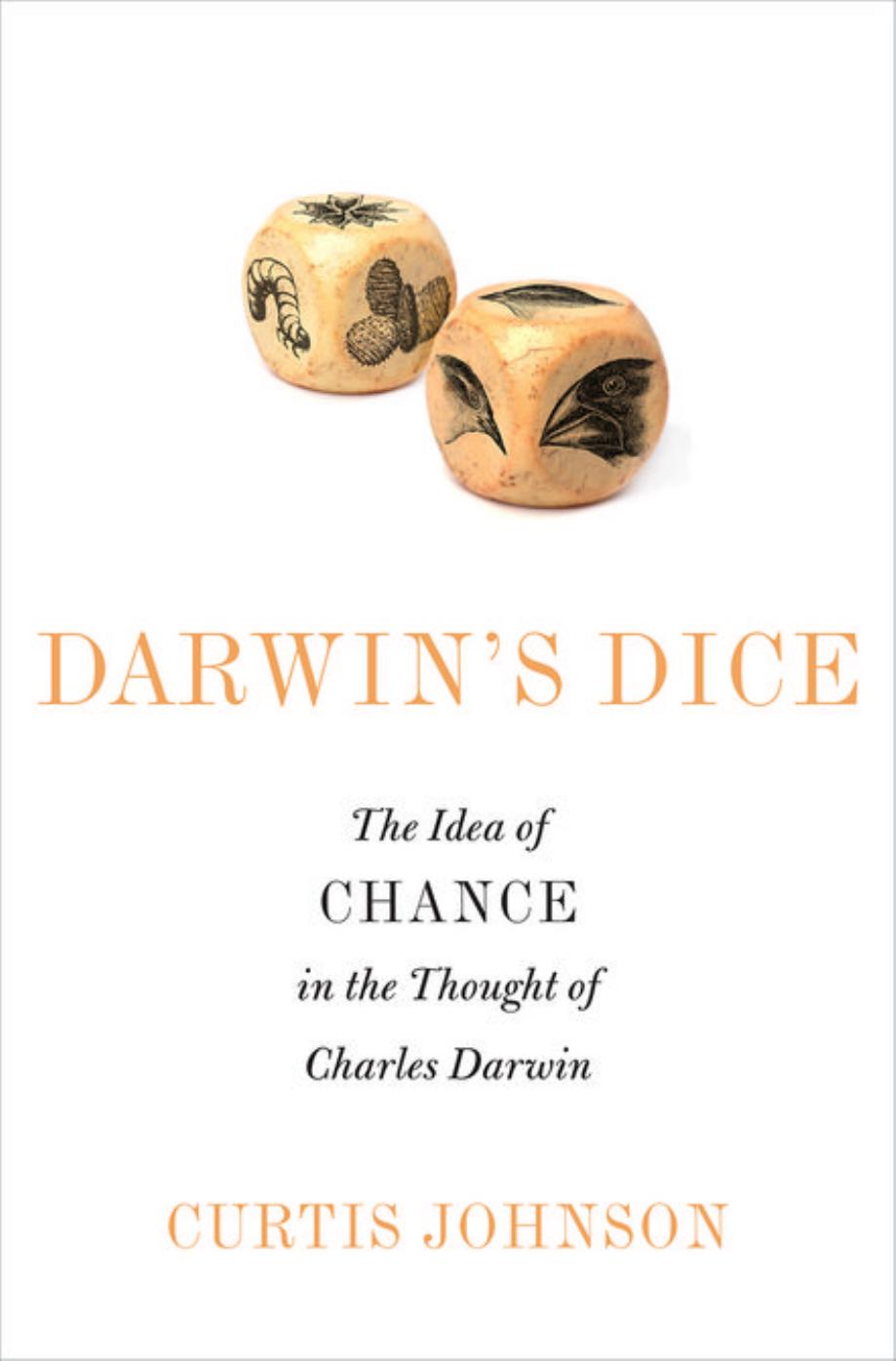Darwin's Dice: The Idea of Chance in the Thought of Charles Darwin by Curtis Johnson

Author:Curtis Johnson [Johnson, Curtis]
Language: eng
Format: epub, pdf
Publisher: Oxford University Press
Published: 2014-09-01T00:00:00+00:00
DARWIN’S SOURCES
Our question is, how did Darwin come up with that particular expression? It is possible that he invented it himself. That explanation, though, seems unlikely in view of the fact that the phrase was in circulation already, in fact in several authors with whose writings Darwin was familiar. We will examine these other possibilities and then venture an opinion about the most likely source.
The question is complicated by another one: what did his source (if he had one) mean by the expression? Did Darwin merely adopt a phrase whose established meaning was already congenial to him, or did he put his own “spin” on it? The examination thus needs especially to take a look at issues both of meaning and timing—when a particular source appeared, what the phrase meant to its author, when Darwin read it, and when he began employing the new expression in his own writing.
It is to be emphasized that our question does not concern the origin of the idea of “chance” or “so-called spontaneous” variation. That, as shown in previous chapters, is a more complicated question. Let it suffice here to recall only that the idea was deeply engrained in biological thought well before Darwin. He may have picked it up from any number of sources from Aristotle2 to Francis Bacon to David Hume to Maupertius; or, for that matter, he may have come upon it on his own. Whatever its source, the idea already had found a place in Darwin’s theory as early as 1837, as is confirmed by several entries in the Notebooks and as documented above.3
As for the expression “spontaneous variation,” in contrast to the idea, three candidates stand out as the most likely sources: Prosper Lucas, Herbert Spencer, and Aristotle. I shall examine each in turn directly. But as a preliminary matter, four other people who could plausibly be assumed to have influenced Darwin should be ruled out: Darwin’s friend and confidant J. D. Hooker, his mentor Charles Lyell, his “bulldog” T. H. Huxley (also called Darwin’s “general agent” by Huxley’s son Leonard Huxley in his Life and Letters of Thomas H. Huxley, 1901, vol. 1, 183), and the increasingly well-established philosopher J. S. Mill.
Of the four, only T. H. Huxley and Mill appear ever to have used the expression. Huxley did so in a letter to J. D. Hooker, written on April 18, 1861. In it he mildly criticized Darwin for having to speak “as if” variations are “spontaneous or a matter of chance” because Darwin could not make out the “law of variation” that would explain how variations arise (1901, vol. 1, 245). At the same time Huxley understood that Darwin’s formulation—chance variation—is what mainly separated Darwin’s theory from that of Lamarck, and Huxley clearly understood Darwin’s way of putting it to be an improvement over Lamarck. Darwin had not used the phrase “spontaneous variation” before this letter was written, so one should weigh the possibility that he picked up the phrase from Huxley, or from Huxley’s correspondent Hooker.
No evidence can be found to support that speculation.
Download
Darwin's Dice: The Idea of Chance in the Thought of Charles Darwin by Curtis Johnson.pdf
This site does not store any files on its server. We only index and link to content provided by other sites. Please contact the content providers to delete copyright contents if any and email us, we'll remove relevant links or contents immediately.
Sapiens: A Brief History of Humankind by Yuval Noah Harari(14370)
Sapiens by Yuval Noah Harari(5366)
Pale Blue Dot by Carl Sagan(4996)
Homo Deus: A Brief History of Tomorrow by Yuval Noah Harari(4908)
Livewired by David Eagleman(3765)
Origin Story: A Big History of Everything by David Christian(3687)
Brief Answers to the Big Questions by Stephen Hawking(3430)
Inferior by Angela Saini(3311)
Origin Story by David Christian(3195)
Signature in the Cell: DNA and the Evidence for Intelligent Design by Stephen C. Meyer(3132)
The Gene: An Intimate History by Siddhartha Mukherjee(3095)
The Evolution of Beauty by Richard O. Prum(2993)
Aliens by Jim Al-Khalili(2827)
How The Mind Works by Steven Pinker(2813)
A Short History of Nearly Everything by Bryson Bill(2689)
Sex at Dawn: The Prehistoric Origins of Modern Sexuality by Ryan Christopher(2528)
From Bacteria to Bach and Back by Daniel C. Dennett(2481)
Endless Forms Most Beautiful by Sean B. Carroll(2474)
Who We Are and How We Got Here by David Reich(2431)
